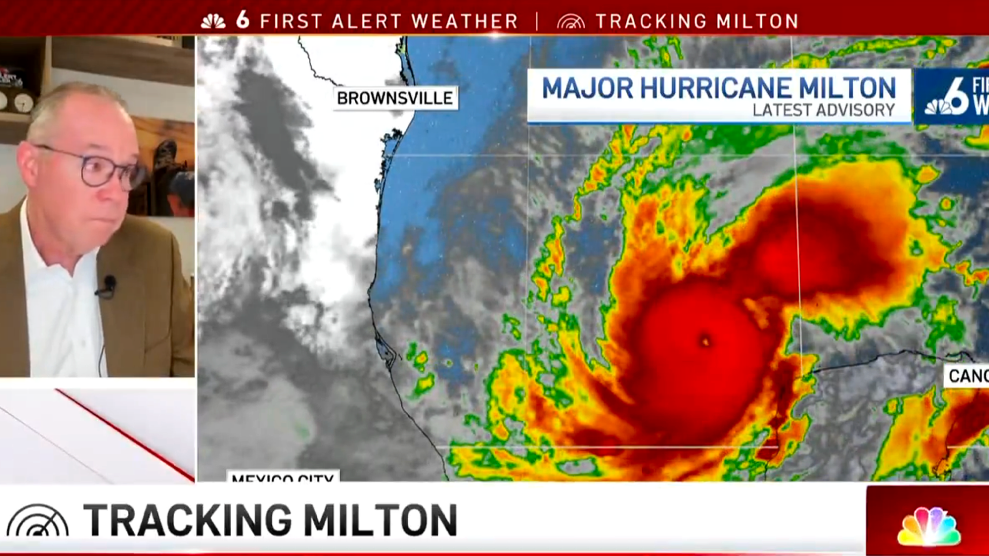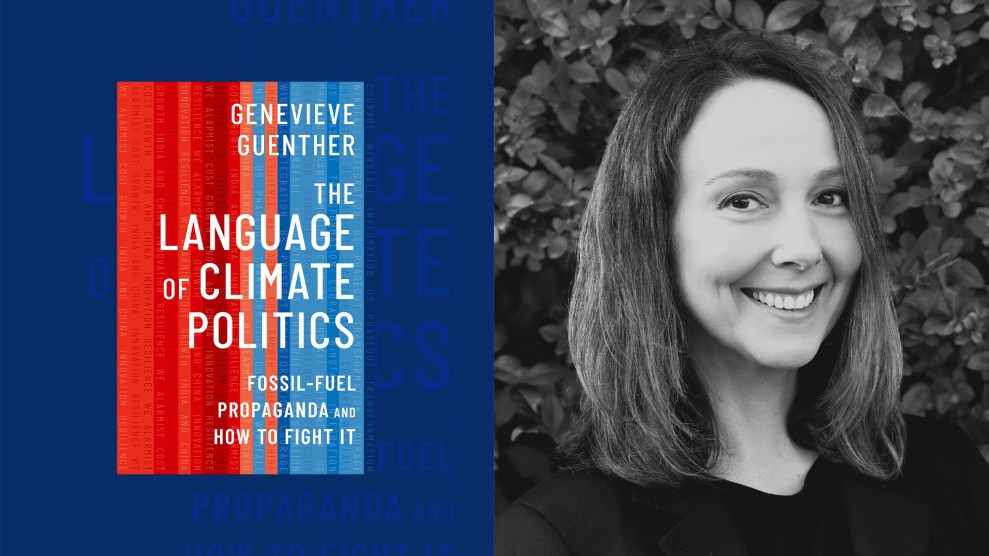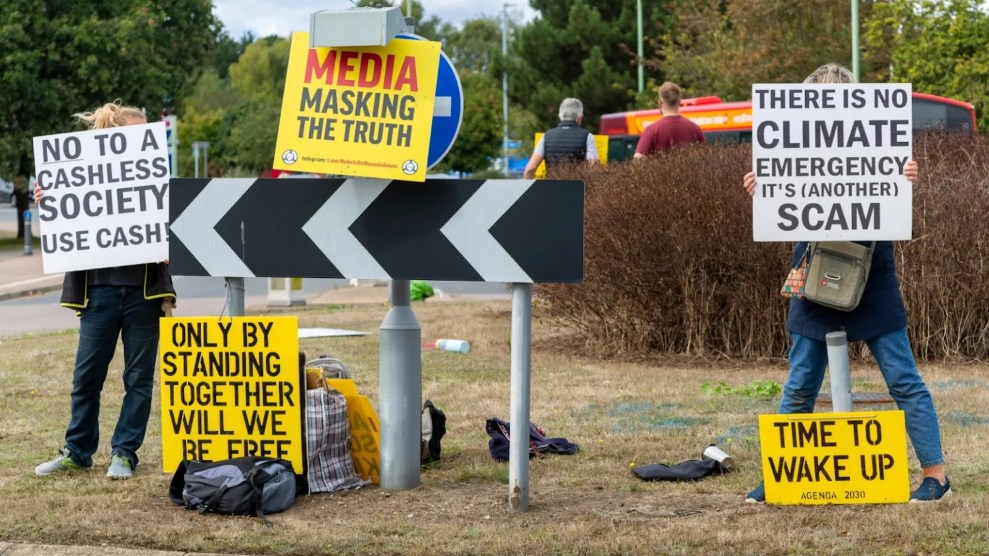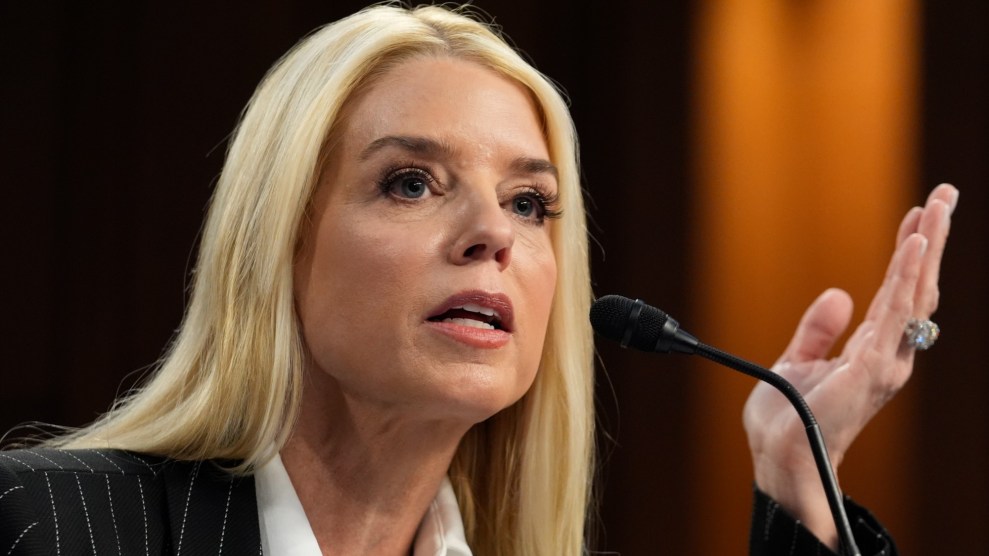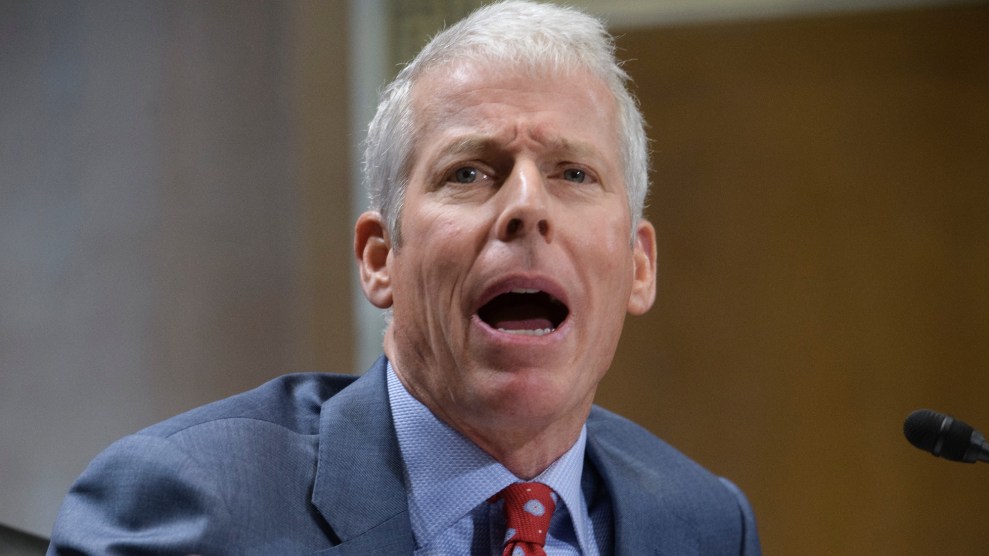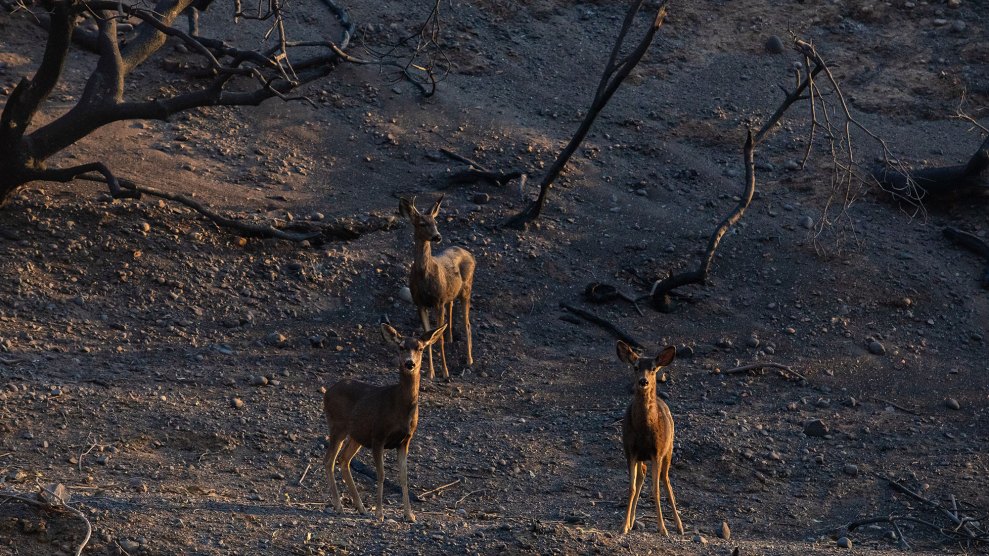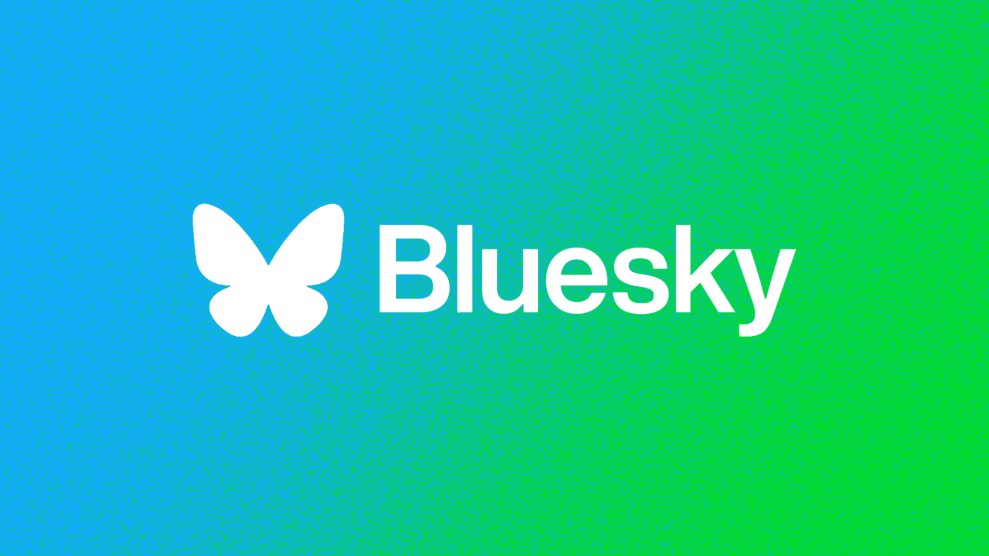
Mother Jones illustration
Ketan Joshi did not mean to become the manager of all things climate on Bluesky, the fast-growing social media platform that’s trying to compete directly with Twitter.
GreenSky was designed to be this overarching, overall thing that encompassed all the communities. I see that emerging through the GreenSky feed, because you see people from very disparate communities talking to each other.
The 39-year-old Australian expat who now lives in Oslo, Norway has spent his career writing about green energy as a communications specialist for renewable energy companies and author of Windfall: Unlocking a Fossil-Free Future, but found it especially hard to share climate information on platforms like Instagram and Twitter. Those sites seemed built toward sowing discord and had secret rules about what posts would do well. Immediately, he noticed that Bluesky was different.
Built as an open-source decentralized network, Bluesky’s architects, which included Twitter co-founder and former CEO Jack Dorsey, wanted to create something that was user-led rather than company-led. (Dorsey is no longer involved and the project is led by Jay Graeber, who promises to “billionaire proof” the site.) What it means is that Bluesky has no all-powerful algorithm directing content. Instead of trusting a privately-owned, sometimes-biased, often-inflammatory and increasingly misinformed system, users can choose multiple feeds from thousands of mini-algorithms built by users. Or make their own.
Early on in the project Dorsey, who is no longer involved, stated: “Existing social media incentives frequently lead to attention being focused on content and conversation that sparks controversy and outrage, rather than conversation which informs and promotes health.” Bluesky’s goal was to change that.
The appeal seems to be working. The platform now has 25 million users, and counting. In the days following Donald Trump’s re-election in a campaign that was supercharged by Elon Musk, who owns Twitter , over 1 million new users joined the site.
Joshi has been on Bluesky for a while–since the site had less than 100,000 users. He built up his climate community on Bluesky by searching manually for folks involved in climate change work. He followed and added their names to spreadsheet to keep track
At first the spreadsheet was just for Joshi, but quickly there was interest from those in his network, so he shared it widely.
(Nowadays, Bluesky has improved on the spreadsheet sharing with a function where users can curate lists of other users called Starterpacks with the option to “follow” or “block” all of them.)
Joshi also created a feed that congregated all the posts from users on his climate list. It, like many other early Bluesky feeds, like Blacksky and BookSky, combined a keyword with sky—”GreenSky”—each varying in capitalization. The result was a unique space where everyone was talking about the environment.
GreenSky is a “Top-50” feed with near-constant engagement and frequent debates as those in different climate camps come face off on policy disagreements in real time. In early January, in the midst of devastating fires in Los Angeles, posters used the feed to stay up to date, grapple with how climate led to their ferocity, and sift through misinformation. Top climate voices, like energy transition engineer Jesse Jenkins and Farhana Sultana, author of Confronting Climate Coloniality, are members and frequent posters.
Mother Jones spoke to Joshi about the unique climate dialogues emerging on BlueSky, facilitated by GreekSky, how he is trying to manage it, and the role that social media plays in climate engagement broadly.
How has GreenSky changed since the early days, beyond sheer growth?
I added a keyword filter which limits posts to [77] climate keywords only. But Bluesky is such a flexible, open platform, so I created a second version that is just the unfiltered thoughts of everybody on that list, if you desire to have it that way. And then, a friend on Bluesky decided that he liked green sky, but wanted a different filtering on it, so he created a version that not only filters for the keywords, but also filters for sort of popularity and engagement.
It’s a basic thing that people can riff off. They can make their own version. I think that’s really quite wonderful.
You have a presence on several social media platforms, and seem to be in the habit of making a climate community on each one. How did that experience translate into managing climate posting on Bluesky?
The key thing that I find on the other sites, very consistently, is that in the process of trying to find your people and then communicate with your people, you’re kind of swimming against the tide.
Instagram is a nice example where there’s a sort of this behavioral culture of people trying to act and speak and present their content in a way that pleases a secret formula. And I’ve done that. I’m there googling the type of thumbnail to use and the type of description to use and the perfect length to please the sort of secret algorithms.
So Bluesky is quite different?
One thing I have noticed is people are very quickly unlearning the habits of trying to please the algorithm. Other websites down rank hyperlinks because they don’t want people leaving the website. They don’t want the eyeballs of the people going away from the website and away from advertisers. That doesn’t happen on Bluesky unless somebody makes a feed that has the formula inside it. But no one’s going to subscribe to that feed because we all love seeing each other’s work. That really stands out to me, where there’s a lot of sharing of work, there’s a lot of sharing of reports, people link to other places on the internet. Bluesky is a conduit.
Bluesky gets the critique of being an echo chamber a lot, but I’ve noticed a huge diversity of opinions in the climate side of Bluesky. What are your observations?
The climate community has its own bubbles: climate science and ecological sciences, energy technology and investment innovation, indigenous rights. I don’t wring my hands about [this]. You see this anxiety about cross chatter between communities and or even Bluesky being a silo but it’s just, it’s simply not the case? That’s not how communities form on a well designed social media site. What you get is people cluster with topics they want to hear from and people they want to hear from, and then they sort of cross through each other, sometimes often in bad ways, often in good ways.
GreenSky was designed to be this overarching, overall thing that encompassed all the communities. I see that emerging through the GreenSky feed, because you see people from very disparate communities talking to each other.
What do those debates look like on Greensky?
I very intentionally designed it so that replies show up in the feed so people are replying to each other. I want it to be a little bit noisy. I want it to be a little bit overwhelming.
I’ve seen debates occur in very refreshing and unique ways that are passionate, but they never default to hate and personal invective. You can tell that the blood pressure is high and that people feel strongly when they’re replying. It’s not dispassionate or boring. But, I have not seen it sort of like falling to insults or to snide, snippyness, like we have seen on other sites.
It’s a nice style of interaction, because it’s a fight. It’s a proper fight, people mean it, but at the same time, they’re not full of hate or developing beef.
People who have been on X for a while now, they’ve been subject to the design of the website, which is obviously encouraging conflict as much as possible as a way to keep people on there.
I’m sure there are many examples of actual, proper, personal, interpersonal hate on arguments in Bluesky and even in the climate space. But I would say, as a general thing, it feels like an improvement.
What are some of the biggest debates on GreenSky right now?
Permitting reform, the abundance agenda, gas terminals, Biden’s overall agenda.
A big one is how to deploy clean energy in the US. On one side, you’ve kind of got the people who say wind power and solar power should be somewhat deregulated and rolled out in a faster way to achieve quicker, deeper emissions reductions. It’s justified on the grounds of: this is an urgent problem, and when you have too much process, then you end up with people like blockers and NIMBYs, and they sort of block like wind funds and solar farms.
And then the other side, which I’m a little bit more aligned with is like: “Yes, permitting needs to be reformed, but it should be reformed in a way that encourages more community engagement and community benefit sharing, because that will actually result in the quicker roll out.”
These two sides of the debate are like red hot right now, because the political change was so clearly stressful on a lot of people who are allies but have a different idea about how to reach the same goal, and so the intensity of these debates has increased.
What about management? How have you handled the influx of billions people onto Bluesky and thousands of people to your feed?
This is something that I’m a little daunted by because my criteria when I first started making this list, was literally “climate people,” and that can mean quite a lot of things. It can mean somebody who doesn’t work in any professional sense in climate, but is extremely interested in it. I always told myself that the keyword filtering will do the job.
I actually haven’t updated it with the new opt-in requests from the great surge of earlier, so it’s going to get a lot noisier in the next couple of weeks. It’s probably going to double in size or so.
I monitor the feed pretty closely to see who’s posting in it and what type of topics get filtered through the keyword filter. It seems okay so far.
One thing I really want to try and preserve is how diverse the climate community is across those different groups, while at the same time sort of acknowledging who’s missing. There’s quite a few groups missing, and it’s because they haven’t really joined Bluesky yet. Climate activists who rely very much on strong preexisting networks. They can’t just quit their network and then just hope that everybody else will run behind them. That’s going to take longer, but the clusters of people will expand pretty significantly over the next year or so.
What about moderating bad stuff?
One day somebody’s going to request to join, who is, for instance, sailing close to the wind of being a climate denier or a delayer.
The initial policy that I had on GreenSky was “no dickheads,” which is an Australian term. I will only kick somebody off the list if they’re either abusive, if they’re breaching any of Bluesky’s basic moderation rules, or if it’s a pretty cut and dried case of mis- or disinformation spreading.
The feed is probably going to grow. It’s going to need to have a lot more transparency around how I deal with a lot of those questions. I am thinking about a log of content that has been flagged.
I guess that makes me a forum moderator type due, and that is not something I’ve ever done before. That’s the only thing I wish I had prepared for, but I’m lucky. I’ve got access to a huge community of people who will offer good advice.
What is the future of climate online, Bluesky or otherwise?
I’ve spoken to climate activists about the social media they’re using and what they prefer and what they and what they’re interested in. I think someone once jokingly referred to it as a millennial retirement home when it was first set up. That just cut deep out of its sheer truthfulness.
Something that occurred to me when they told me about that is that they don’t need to join Bluesky. This is an open protocol. It should hypothetically, eventually be such that it would be incredibly easy to set up your own [social] server.
Some people really need video. Some people really need a network that is secure and can’t be taken down by an authoritarian regime.
I’m imagining a future for different climate communities where it’s not about Bluesky or GreenSky, but the protocol that enables interconnectedness between different purposes and needs for the community.


